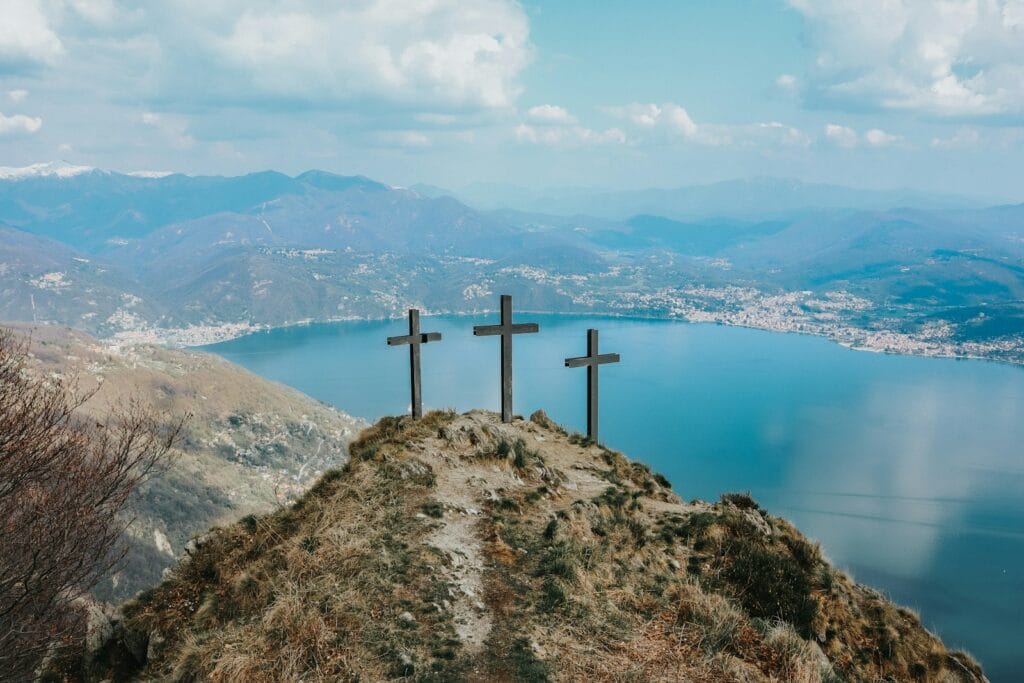Grace vs. Works – How We Are Saved
Scripture Focus: Ephesians 2:8-9, Romans 11:6, Titus 3:5 There’s a battle raging in the heart of every person who has ever heard the gospel. It’s not a battle between good and evil, or even between faith and doubt. It’s a battle between two fundamentally different ways of understanding how a person gets right with God. On one side stands grace—God’s unmerited favor freely given to undeserving sinners. On the other side stands works—the human attempt to earn salvation through good deeds, religious rituals, and moral performance. This isn’t just a theological debate for seminary classrooms. This is the most practical, life-changing truth you’ll ever encounter. How you answer this question will determine whether you live in freedom or bondage, whether you experience peace or anxiety, whether you rest in God’s finished work or exhaust yourself trying to earn His approval. The tragedy is that most people, even many who call themselves Christians, are confused about this fundamental truth. They’ve mixed grace and works together, creating a gospel that sounds Christian but actually robs them of the very peace and assurance that salvation is meant to bring. The Human Heart’s Natural Religion Before we dive into what Scripture teaches, let’s be honest about what feels natural to us. Every human heart has the same instinctive response to the idea of salvation: “What must I do to be saved?” It’s the question the Philippian jailer asked Paul and Silas in Acts 16:30, and it’s the question that echoes in every human heart. We naturally think in terms of earning, deserving, and paying our way. When someone does something kind for us, we feel obligated to return the favor. When we make a mistake, we instinctively try to make up for it. This isn’t wrong in human relationships—it’s how society functions. But when we bring this same mindset to our relationship with God, we create a religion of works that is completely opposite to the gospel. The apostle Paul understood this human tendency better than anyone. Before his conversion, he was the epitome of a works-based religionist. In Philippians 3:4-6, he describes his impressive religious résumé: “circumcised on the eighth day, of the people of Israel, of the tribe of Benjamin, a Hebrew of Hebrews; as to the law, a Pharisee; as to zeal, a persecutor of the church; as to righteousness under the law, blameless.” If anyone could have earned salvation through works, it would have been Paul. But what did he conclude about all his religious achievements? “But whatever gain I had, I counted as loss for the sake of Christ” (Philippians 3:7). The Crystal Clear Teaching of Scripture Let’s settle this question once and for all by looking at what God’s Word actually teaches about salvation. The Bible is remarkably clear on this issue so clear that it’s impossible to misunderstand unless we’re actively trying to avoid the truth. Ephesians 2:8-9 gives us the most straightforward explanation: “For by grace you have been saved through faith. And this is not your own doing; it is the gift of God, not a result of works, so that no one may boast.” Let’s break this down: Romans 11:6 drives the point home even more forcefully: “But if it is by grace, it is no longer on the basis of works; otherwise grace would no longer be grace.” Paul is saying that grace and works are mutually exclusive. If salvation depends on works, then it’s not grace. If it’s by grace, then works have no part in it. Titus 3:5 removes any remaining doubt: “He saved us, not because of works done by us in righteousness, but according to his own mercy, by the washing of regeneration and renewal of the Holy Spirit.” The Impossibility of Works-Based Salvation Why is God so adamant that salvation cannot be by works? Because works-based salvation is not just difficult—it’s impossible. Here’s why: God’s Standard is Perfection James 2:10 explains: “For whoever keeps the whole law but fails in one point has become accountable for all of it.” God’s standard isn’t “pretty good” or “better than average.” It’s absolute perfection. One sin—just one—makes you guilty of breaking God’s entire law. Our Righteousness is Filthy Rags Isaiah 64:6 gives us God’s evaluation of our best efforts: “We have all become like one who is unclean, and all our righteous deeds are like a polluted garment.” Even our very best works are utterly defiled in God’s sight. We Are Dead in Our Sins Ephesians 2:1 describes our spiritual condition before salvation: “And you were dead in the trespasses and sins.” Dead people can’t contribute to their own resurrection. A spiritually dead person cannot perform spiritually acceptable works. The Beautiful Truth About Grace Grace is not just God’s backup plan when our works fail. Grace is God’s primary plan, designed before the foundation of the world to demonstrate His love and bring Him maximum glory. Grace is Unmerited Favor The most basic definition of grace is “unmerited favor”—receiving something good that you don’t deserve. But biblical grace goes even deeper. It’s receiving the ultimate good (salvation and eternal life) while you deserved the ultimate bad (judgment and eternal death). Romans 5:8 captures this beautifully: “But God shows his love for us in that while we were still sinners, Christ died for us.” Not after we cleaned up our act. Not after we proved we were worthy. While we were still sinners—actively rebelling against God—Christ died for us. Grace is Completely Free Romans 3:24 says we are “justified by his grace as a gift, through the redemption that is in Christ Jesus.” A gift that you have to pay for or work for isn’t really a gift—it’s a purchase or a wage. But salvation is a true gift, requiring no payment or work from the recipient. Grace Produces Works Here’s where many people get confused. They think that if salvation is by grace apart from works, then works don’t matter at all. But that’s not what Scripture teaches. Ephesians 2:10,


